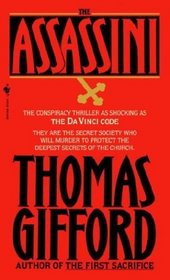Helpful Score: 1
From Publishers Weekly
Gifford's ( The Wind Chill Factor ) splendid thriller--his first novel in 11 years--takes place as the Catholic Church prepares to elect a new pope and an ancient and deadly secret society, its roots deep in Church history, takes murderous action. An ambitious monsignor and a well-connected lay power broker are executed in New York City; hours later, a radical activist nun writing a book on the Church's role in WW II is killed in Princeton, N.J. The nun's brother, lawyer Ben Driskill, a cynical ex-Catholic and former Jesuit seminarian, determines to avenge her murder. He must track down the meaning of the tattered WW II photo his sister left behind, featuring one of the two likeliest candidates for the papacy, and discover why she was investigating the suicide in Princeton of a visiting priest 50 years earlier. Driskill's perilous journey takes him to Egypt, Paris, Ireland and Rome, where another American nun is asking similar questions. As their paths converge, dark secrets from the Church's history in WW II are revealed. Despite the fact that many readers will identify the mysterious "Archduke" well before the somewhat overwrought conclusion, Gifford delivers a classic thriller: well-written, plausible and thought-provoking. 50,000 first printing; $50,000 ad/promo.
Copyright 1990 Reed Business Information, Inc.--This text refers to an out of print or unavailable edition of this title.
This is a reissue of a novel first published in 1990
In a way, this novel may have been over-researched, i.e., some parts seem to be more a treatise on the author's research than a novel. While the plot is generally well developed, it is complex and skips back and forth between various characters. It is an interesting story of people seeking power at any price. It some respects it is an alternate history; and it shows the Catholic church in a bad light. It is a medieval type drama, with people using assassination, blackmail, and bribery to gain control of the Vatican. A pope is dying, and factions are maneuvering for position.
The plot deals with the theft of art treasures during World War II. Readers might have an interest in "The English Assassin" by Daniel Silva, which deals with that issue and the peculiarities of Swiss Law about ownership.
Gifford's ( The Wind Chill Factor ) splendid thriller--his first novel in 11 years--takes place as the Catholic Church prepares to elect a new pope and an ancient and deadly secret society, its roots deep in Church history, takes murderous action. An ambitious monsignor and a well-connected lay power broker are executed in New York City; hours later, a radical activist nun writing a book on the Church's role in WW II is killed in Princeton, N.J. The nun's brother, lawyer Ben Driskill, a cynical ex-Catholic and former Jesuit seminarian, determines to avenge her murder. He must track down the meaning of the tattered WW II photo his sister left behind, featuring one of the two likeliest candidates for the papacy, and discover why she was investigating the suicide in Princeton of a visiting priest 50 years earlier. Driskill's perilous journey takes him to Egypt, Paris, Ireland and Rome, where another American nun is asking similar questions. As their paths converge, dark secrets from the Church's history in WW II are revealed. Despite the fact that many readers will identify the mysterious "Archduke" well before the somewhat overwrought conclusion, Gifford delivers a classic thriller: well-written, plausible and thought-provoking. 50,000 first printing; $50,000 ad/promo.
Copyright 1990 Reed Business Information, Inc.--This text refers to an out of print or unavailable edition of this title.
This is a reissue of a novel first published in 1990
In a way, this novel may have been over-researched, i.e., some parts seem to be more a treatise on the author's research than a novel. While the plot is generally well developed, it is complex and skips back and forth between various characters. It is an interesting story of people seeking power at any price. It some respects it is an alternate history; and it shows the Catholic church in a bad light. It is a medieval type drama, with people using assassination, blackmail, and bribery to gain control of the Vatican. A pope is dying, and factions are maneuvering for position.
The plot deals with the theft of art treasures during World War II. Readers might have an interest in "The English Assassin" by Daniel Silva, which deals with that issue and the peculiarities of Swiss Law about ownership.





